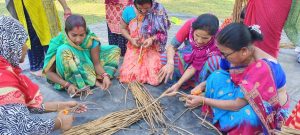Guwahati, Feb 1: Conservation of habitat is key to the conservation of not only the Greater one-horned rhino but any other species because wildlife conservation efforts are as good as the health of the habitat.
Sustained efforts for reduction of fringe area villagers’ dependence on forest resources is important for conservation of wildlife habitats. Research-driven biodiversity conservation organisation Aaranyak with support from US-based donor agency International Rhino Foundation (IRF) is planning a series of programme to train villagers from the fringes of Laokhowa and Burhachapori Wildlife Sanctuary (L&BWLS), according to Aaranyak official Arif Hussain who is coordinating this programme in a collaborative mode.
Laokhowa and Burhachapori Wildlife Sanctuary in Central Assam has been in news after sightings of two one-horned rhinos there recently after a gap of about four decades, thanks to a massive eviction drive conducted by the Forest Department earlier last year to root out land grabbers from the wildlife sanctuary.
Though L&BWLS used to be a hub of one-horned rhinos, the species were wiped out in the late 1980s by poachers taking advantage of the social unrest prevailing in Assam Valley during that period.
As part of the programme to help fringe area villagers explore alternative livelihood options, Aaranyak facilitated a cooking, catering, and hospitality training session for villagers of Borunguri-Bongaon village on the fringe of Laokhowa-Burhachapori Wildlife Sanctuary in order to enhance their skills. Notably the villagers participating in the training have already started an ethnic food outlet, Bwisang Na.
The training was organised by Aaranyak on January 21 in collaboration with the Kaziranga National Park and Tiger Reserve authority, Laokhowa-Burhachapori Wildlife Sanctuary authority, Nagaon Wildlife Division, Nowgong Girls’ College and Laokhowa-Burhachapori Conservation Society (LBCS) with support from the International Rhino Foundation.
Participants also had the opportunity to experience hands-on demonstrations of cooking, catering, and hospitality from an expert, Rehan Ali.
The programme was graced by Range Officer of Dhania Range SK Gupta, Aaranyak official Arif Hussain, Smarajit Ojha of LBCS, Kamal Bora, Beat Officer of Laokhowa Beat, Bonojit Lalung, Abhijit Sarma and Boluram Balari from Borunguri and Bongaon EDC.
In another such session of training on alternative livelihood, women in Dhania village, fringe of Laokhowa-Burhachapori Wildlife Sanctuary, took part in a five-day training programme to develop skills and ensure sustainability of products made from water hyacinth.

The training was organised by Aaranyak from January 4-9 this year in collaboration with the Kaziranga National Park and Tiger Reserve Authority, Laokhowa-Burhachapori Wildlife Sanctuary Authority, Nagaon Wildlife Division, and Laokhowa-Burhachapori Conservation Society with support from the International Rhino Foundation.
Aaranyak’s official Arif Hussain facilitated the training which was attended by 22 community women members.



